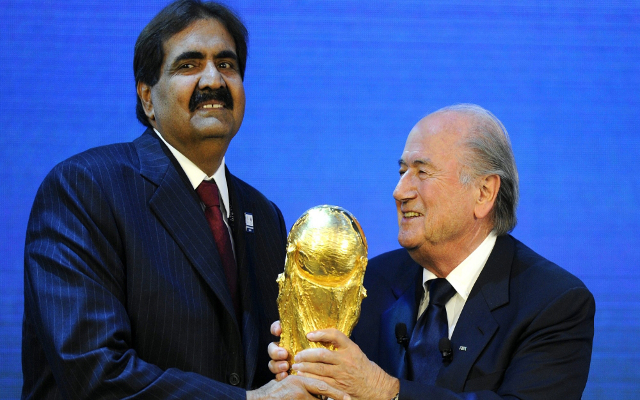In December 2010, Qatar was named the 2022 Fédération Internationale de Football Association (FIFA) World Cup host. Since the announcement, Qatar’s construction industry has since grown exponentially in an effort to complete the many infrastructure projects that the tournament requires. The upcoming World Cup requires new infrastructure capable of housing the games and accommodating the influx of fans and tourists travelling to Qatar for the event. Major construction projects, such as Khalifa stadium, the Qatar Rail project, and smaller hotel and shopping mall projects, force Qatar and FIFA to outsource this work to migrants in order to meet their 2022 deadlines. Migrant workers comprise over 90 percent of Qatar’s workforce, and many of them work doing physical labor, such as construction. While migrant worker abuse was a deeply ingrained problem in Qatar well before the country was awarded the 2022 World Cup, the government’s preparation for the event coupled with FIFA’s willingness to exploit the labor climate has exacerbated an already abusive system.
In addition to the exploitation, such as contract substitution and passport revocation, they face upon arrival in Qatar, migrants’ work at the construction sites is dangerous, and can be fatal. Despite this, employers rarely allow injured workers to seek treatment for workplace accidents. In September 2013, the International Trade Union Confederation estimated that over 4,000 workers could lose their lives in the remaining of the construction project, as the then-current rate of 400 deaths per year could rise to 600 unless the government made significant reforms.
Due to the increased human trafficking and forced labor abuses resulting from the increased FIFA construction projects, many different unions, advocacy groups, and international entities have made recommendations to the Government of Qatar as well as to FIFA. In April 2014, the law firm of DLA Piper, hired by the government to investigate reports of human rights abuses, released its report detailing labor abuses in Qatar and made a number of its own recommendations for the government. Among the firm’s recommendations was that Qatar should review the kafala system and “address whether certain aspects of the system should be abolished or phased out over time,” in addition to specifically calling for the exit visa system to be abolished. However, since its release in April 2014, Qatar has implemented few of its recommendations, and has especially avoided those requiring substantial review and change.
On 28 May 2015, reacting to FIFA and Qatar’s continued failures, Building and Wood Workers’ International (BWI) filed a complaint to the Swiss National Contact Point for the Organization for Economic Co-operation and Development (OECD) against FIFA, highlighting that FIFA violated OECD Guidelines. The complaint emphasized that the Qatari government fails to protect the workers within its borders, and FIFA is also culpable in the abuses by exploiting the government practices that were already in place. It also claimed that FIFA failed to address Qatar’s negative human rights record in the 2010 World Cup bidding process, and it continues to fail “to conduct ongoing due diligence with regard to the violations of rights of migrant workers in Qatar.”
In December 2015, FIFA asked John G. Ruggie, former top UN official on business and human rights, to develop recommendations on how the Association could embed respect for human rights into its global operations. In April 2016, Ruggie released 25 recommendations, calling on FIFA to adopt a clear and coherent human rights policy and appoint designated members to oversee the policy. Unlike the Qatari government, FIFA does not have the jurisdictional authority to carry out remedies to some of the larger scale abuses in Qatar. Because of this, the recommendations Ruggie laid out for FIFA cannot be effective without cooperating with Qatari officials.
In March 2016, the International Labor Organization (ILO) announced its decision regarding a 2014 complaint it received regarding Qatar’s non-observance of the Forced Labor Convention, 1930 and the Labour Inspection Convention, 1947, specifically in reference to its handling of the FIFA construction projects. The complaint, put forth by 12 multinational delegates to the 103rd International Labour Conference, detailed the harsh labor conditions migrant workers in Qatar face in building infrastructure for the 2022 World Cup, as well as the Qatari government’s inability to properly inspect sites and enforce labor laws. The complaint concluded with a recommendation that the ILO immediately establish a Commission of Inquiry (CoI) in Qatar to investigate the reports of abuse. In March 2016, the ILO Governing Body decided that Qatar would have one more year to prove its willingness to take concrete measure to alleviate its abuses, and requested that Qatar report back to the ILO in March 2017. If Qatar’s report does not satisfy the ILO, the organization could initiate a CoI. CoIs, only utilized 11 times since their establishment, are the ILO’s highest-level investigative procedures. If Qatar refuses to fulfill the CoIs recommendations, the ILO could subject the country to international sanctions.
Neither FIFA nor the Government of Qatar can unilaterally end the human rights abuses the World Cup construction projects have exacerbated. Officials from both governing bodies need to work together to ensure the protection of migrant workers. The Qatari government must strictly enforce its existing labor laws and those it plans to implement soon. FIFA officials must maintain direct oversight over the contractors and subcontractors used to build projects for its event, and create stronger internal policies regarding the protection of human rights. In the future, FIFA should more thoroughly vet its government partners for past or current human rights violations in order to avoid committing abuses in other countries. The international community and its mechanisms, like the ILO, must band together to pressure both the leadership of Qatar and FIFA to work in tandem for the betterment and safety of the over one million migrant workers. No government should be rewarded for its abysmal record on human rights, and FIFA is currently rewarding Qatar for just that.
Brittany Hamzy is an Advocacy Fellow at ADHRB.





